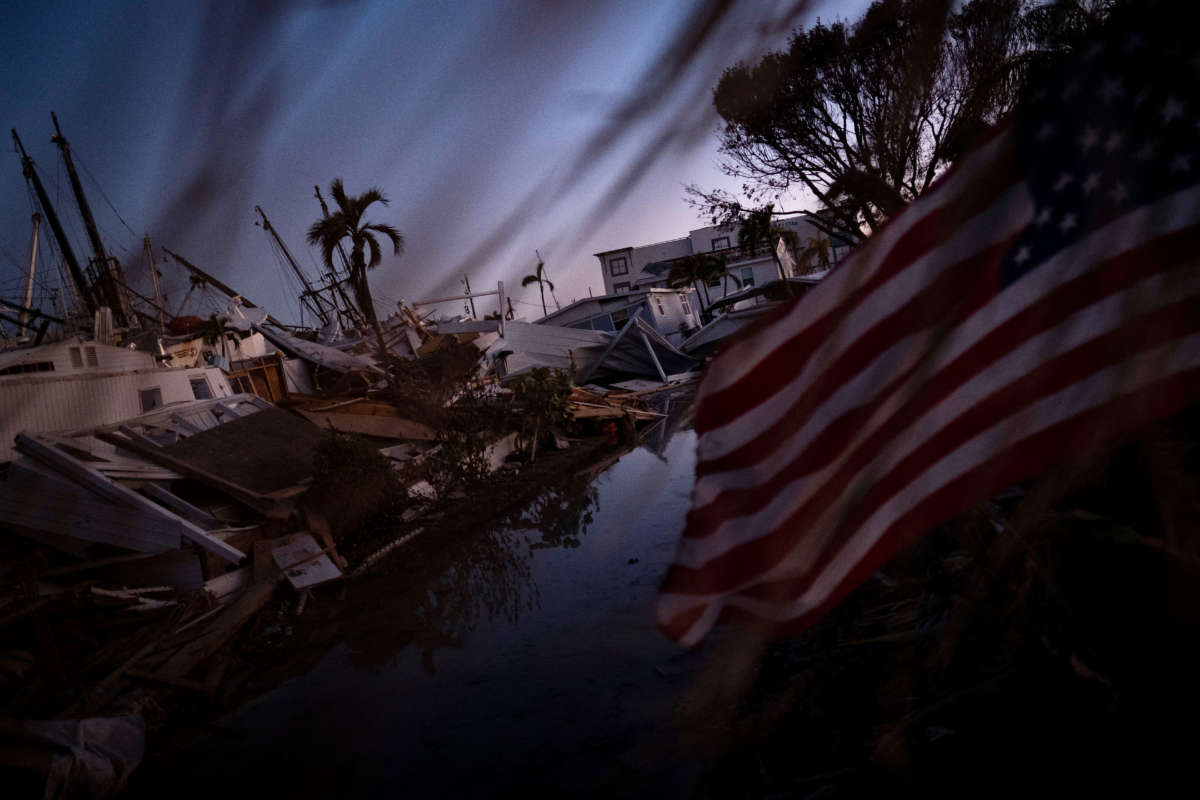Just days after Category 4 Hurricane Ian devastated Florida, killing at least 88 people and leveling and flooding thousands of buildings, nearly every Florida Republican in U.S. Congress voted against a bill containing billions in funding for disaster relief that officials could have accessed to begin recovery after the storm.
Last week, Congress passed a stopgap government funding bill that contained $18.8 billion in Federal Emergency Management Agency (FEMA) funds to account for climate crisis-fueled, worsening natural disasters that Florida officials could use to speed recovery from Ian, according to the Daily Beast. The bill provided FEMA with a year’s worth of disaster funds, rather than just the next few months’ worth.
The bill passed despite widespread opposition from Republicans and the Floridians in the caucus. All 16 Republican House representatives from the state voted against the bill on Friday, including the two Republicans who represent constituents in Lee County, where much of the hurricane’s destruction was felt. In all, 201 Republicans voted against the bill to keep the government funded through December, while only 10 voted for it.
Floridian Republicans in the Senate weren’t on board with the bill either. Sen. Rick Scott voted “no” on the bill, while Sen. Marco Rubio wasn’t present for the vote on Thursday. Rubio said in interviews later that he didn’t vote for the bill because it contained “a bunch of things” unrelated to disaster relief, like additional funding for Ukraine, low-income heating assistance, and relief for Jackson, Mississippi, which is recovering from a historic water crisis.
Despite this, however, the two senators sent a letter to the Senate Appropriations Committee last week asking for a “robust and timely federal response” to the hurricane. “Hurricane Ian will be remembered and studied as one of the most devastating hurricanes to hit the United States,” they wrote.
The government funding bill ultimately passed 72 to 23 in the Senate and 230 to 201 in the House, averting a government shutdown that would have happened at the end of the week.
Even if the FEMA relief funds hadn’t been included in the bill, a government shutdown could have hampered FEMA’s ability to respond to the disaster. In the past, when the government has shut down due to lawmakers’ failure to pass a funding bill, FEMA has historically furloughed thousands of staff.
Democrats castigated Florida Republicans for refusing to support the funding, pointing out their hypocrisy in asking for emergency funding but still voting against or abstaining from voting for the bill.
“The same week that Hurricane Ian brought so much chaos and destruction to Florida, not a single Florida [U.S. House] Republican cared enough to vote in favor of Hurricane relief for the people in their own state hit hardest by the storm,” said Florida Democratic Party Chair Manny Diaz, per the Tallahassee Democrat. “That is a level of callous indifference and political opportunism that boggles the mind.”
Rep. Val Demings, a Democrat who is challenging Rubio in the 2022 election, wrote on Twitter on Sunday, “In the United States Senate, I’ll never put partisan politics over delivering disaster relief for Floridians.”
Congressional Republicans have come under fire in the past decade for voting against disaster relief in the wake of a hurricane. In 2012, for instance, dozens of Republicans voted against relief for Hurricane Sandy, including Florida’s far right Ron DeSantis, then a representative in the House.
In fact, opposing disaster relief funding appears to be supported by a large portion of the Republican caucus. As the Daily Beast notes, the largest internal GOP conference group, the Republican Study Committee, proposes slashing federal disaster relief funding in its latest annual budget proposal.
Media that fights fascism
Truthout is funded almost entirely by readers — that’s why we can speak truth to power and cut against the mainstream narrative. But independent journalists at Truthout face mounting political repression under Trump.
We rely on your support to survive McCarthyist censorship. Please make a tax-deductible one-time or monthly donation.
